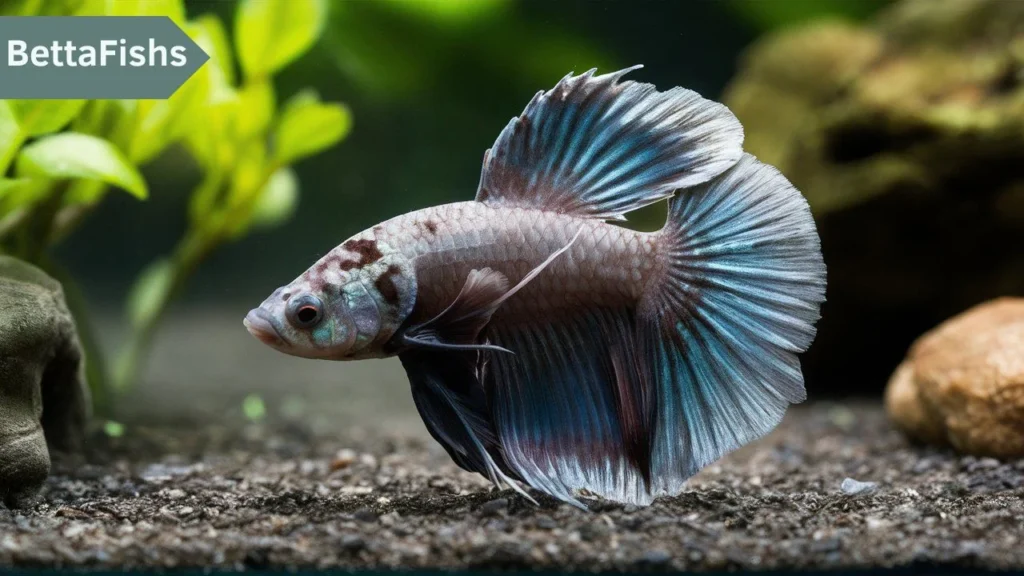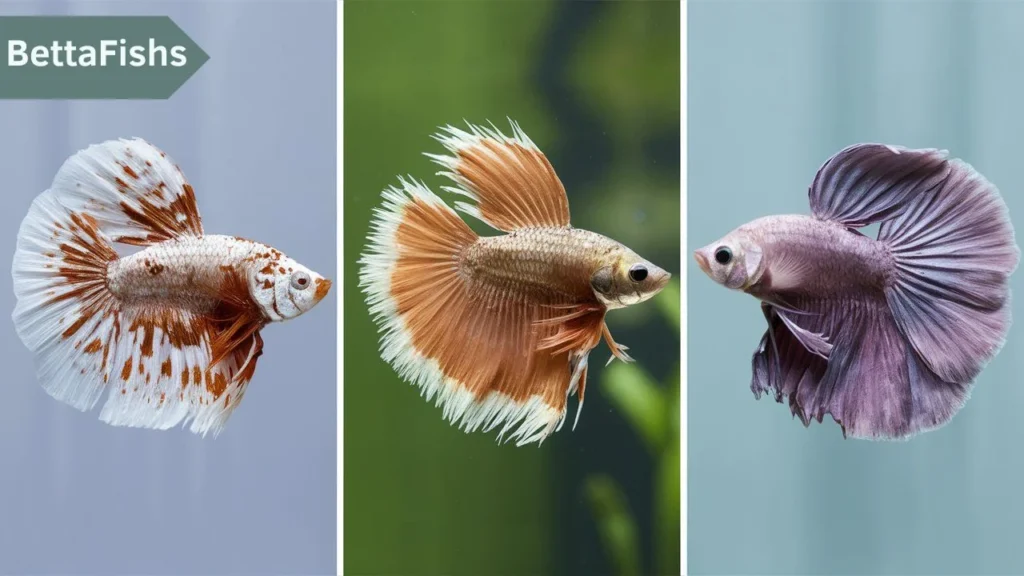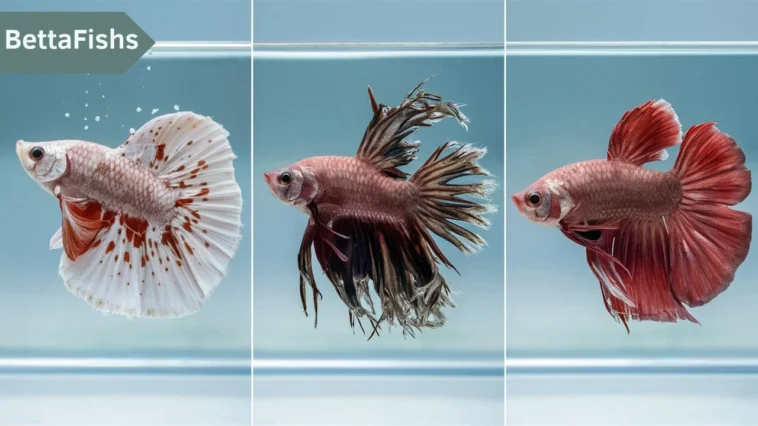Betta fish are not just beautiful creatures; they’re also sensitive and delicate, requiring proper care to thrive. Knowing when your betta fish is sick can be challenging, but it’s crucial for their well-being.
This guide will walk you through the common signs of illness, the underlying causes, and how to treat and prevent diseases. By the end, you’ll be well-equipped to ensure your betta stays healthy and vibrant.
Common Symptoms of a Sick Betta Fish
Physical Symptoms
Color Fading
One of the most noticeable signs that your betta fish may be unwell is a change in color. Betta fish are known for their bright, vivid hues, so if you notice that their color is fading or dulling, it could indicate stress, poor water quality, or a more serious illness.
Clamped Fins
Healthy bettas have open, flowing fins. If your fish’s fins appear clamped or tightly closed against their body, this could be a sign of illness or stress. Clamped fins often accompany other symptoms like lethargy or loss of appetite.
White Spots
The appearance of small white spots on your betta’s body or fins is a common symptom of Ich, a parasitic infection. These spots resemble grains of salt and usually indicate a need for immediate treatment.
Swollen Body or Eyes
Swelling, particularly around the abdomen or eyes, can be a sign of Dropsy, a serious condition often caused by bacterial infections. Dropsy is characterized by a swollen, pinecone-like appearance and requires prompt attention.

Behavioral Symptoms
Lethargy
If your betta is spending more time resting at the bottom of the tank or seems less active than usual, this could be a sign of illness. Lethargy can result from various issues, including poor water quality, stress, or disease.
Loss of Appetite
Betta fish are generally enthusiastic eaters, so a sudden loss of appetite is concerning. If your fish is not eating, it could be due to stress, an underlying illness, or even something as simple as a change in their environment.
Gasping for Air
Betta fish are able to breathe air straight from the surface because to a labyrinth organ. However, if you notice your fish frequently gasping for air, it might indicate poor water quality, low oxygen levels, or a respiratory infection.
Rubbing Against Objects
If your betta is rubbing against objects in the tank, it may be trying to relieve irritation caused by parasites or infections like Ich. This behavior is often accompanied by other symptoms like white spots or clamped fins.
Causes of Betta Fish Illness
Poor Water Quality
Water quality is one of the most critical factors in maintaining a healthy betta fish. Dirty or improperly balanced water can lead to a variety of illnesses. Regular water changes and testing are essential to prevent the buildup of harmful substances like ammonia and nitrates.
Overfeeding
Overfeeding is a common mistake among betta owners. Excess food can lead to obesity, constipation, and poor water quality as uneaten food decays. Feed your betta only what they can consume in a few minutes to avoid these issues.
Stress
Betta fish can become stressed due to various factors, including poor water conditions, an overcrowded tank, or an aggressive tank mate. Stress weakens the immune system, making your betta more susceptible to illness.
Infections and Parasites
Infections and parasites are common causes of illness in betta fish. Bacterial infections, fungal infections, and parasitic infestations like Ich and Velvet Disease can all lead to severe health problems if not treated promptly.
Diagnosing Betta Fish Diseases
Observation Techniques
Regularly observing your betta’s behavior and physical appearance is crucial for early disease detection. Take note of any changes in color, fin condition, or activity levels, as these can be early signs of illness.
Water Testing
Testing the water quality in your betta’s tank is essential for diagnosing potential problems. High levels of ammonia, nitrites, or nitrates can stress your fish and lead to illness. Use a reliable water testing kit to monitor these levels regularly.
Consulting a Vet or Fish Expert
If you’re unsure about your betta’s condition or how to treat it, consulting a vet or an aquarium expert is a wise choice. They can provide advice on the best course of action and suggest suitable medical interventions.

Common Betta Fish Diseases and Their Treatments
Ich (White Spot Disease)
Symptoms
Ich is characterized by the appearance of small white spots on the body and fins of your betta. These spots are caused by a parasitic infection and can lead to severe discomfort for your fish.
Treatment Options
Treatment for Ich typically involves raising the tank’s temperature and adding aquarium salt or a specialized Ich treatment to the water. In order to stop the illness from spreading, swift action is necessary.
Fin Rot
Symptoms
Fin rot is a bacterial infection that causes the edges of your betta’s fins to appear ragged or frayed. If left untreated, the infection can progress, causing the fins to deteriorate further.
Treatment Options
Treating fin rot usually involves improving water quality and using an antibacterial medication. Regular water changes and maintaining a clean tank are key to preventing fin rot from recurring.
Dropsy
Symptoms
Dropsy presents as severe swelling, often giving your betta a pinecone-like appearance due to raised scales. This condition is usually the result of a bacterial infection and is often fatal if not treated early.
Treatment Options
Treatment for Dropsy is challenging and often requires a combination of antibacterial medications and salt baths. It’s crucial to isolate the affected fish to prevent the spread of the infection.
Velvet Disease
Symptoms
Velvet Disease is caused by a parasitic infection and manifests as a gold or rust-colored dust on your betta’s body. Affected fish may also display clamped fins and lethargy.
Treatment Options
Treatment for Velvet Disease includes raising the water temperature, dimming the lights, and using a copper-based medication. Quarantining the infected fish is also recommended to prevent the spread of the disease.

Preventing Betta Fish Illness
Maintaining Water Quality
Regular water changes and monitoring of water parameters are vital for preventing illness in betta fish. Keeping the tank clean and well-filtered helps maintain a healthy environment.
Proper Diet
Feeding your betta a balanced diet of high-quality pellets, supplemented with occasional treats like bloodworms or brine shrimp, is essential for their health. Avoid overfeeding to prevent obesity and related issues.
Reducing Stress
Minimizing stress is crucial for preventing illness in betta fish. Provide hiding spots, avoid overcrowding, and ensure the tank is kept in a quiet, stable environment to help your betta feel secure.
Regular Tank Cleaning
Keeping your betta’s tank clean is one of the best ways to prevent disease. Regularly remove uneaten food, clean the substrate, and change the water to reduce the risk of harmful bacteria and parasites.
Conclusion
Caring for a betta fish requires attention to detail, especially when it comes to their health. By understanding the common signs of illness, potential causes, and effective treatments, you can ensure that your betta lives a long, healthy life. Regular observation, proper tank maintenance, and a balanced diet are key to preventing illness and keeping your betta vibrant and happy.
FAQs
How often should I clean my betta fish tank?
You should clean your betta fish tank at least once a week, depending on the size of the tank and the number of fish. Regular water changes and cleaning help maintain good water quality and prevent the buildup of harmful substances.
Can a betta fish recover from fin rot?
Yes, a betta fish can recover from fin rot if caught early and treated promptly. Improving water quality and using antibacterial medication can help heal the fins and prevent further damage.
How can I tell if my betta fish is stressed?
Signs of stress in betta fish include clamped fins, loss of appetite, lethargy, and unusual behavior such as hiding or aggression. Ensuring a stable environment with clean water and proper tank conditions can help reduce stress.
What should I do if my betta fish stops eating?
If your betta fish stops eating, first check the water quality and temperature. If these are within the proper range, consider if there have been any changes in the environment that could cause stress. If the issue persists, consult a vet for further advice.
Are betta fish prone to specific illnesses?
Betta fish are prone to several specific illnesses, including fin rot, Ich, and Velvet Disease. Proper care, including maintaining clean water, a balanced diet, and minimizing stress, can help prevent these common issues.





5 Comments
Leave a Reply5 Pings & Trackbacks
Pingback:How to treat fin rot in Betta fish?
Pingback:How to Cure Ich in Betta Fish?
Pingback:White patches on Betta fish
Pingback:How to fix fin rot in Betta fish?
Pingback:Why Is My Betta Fish Not Moving?